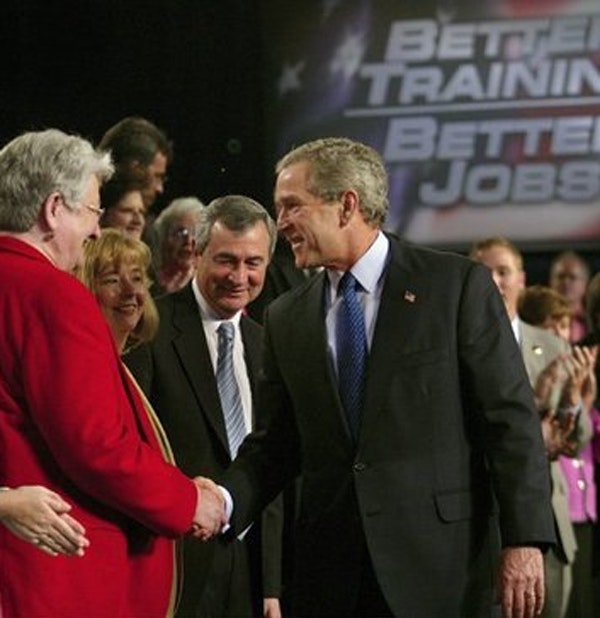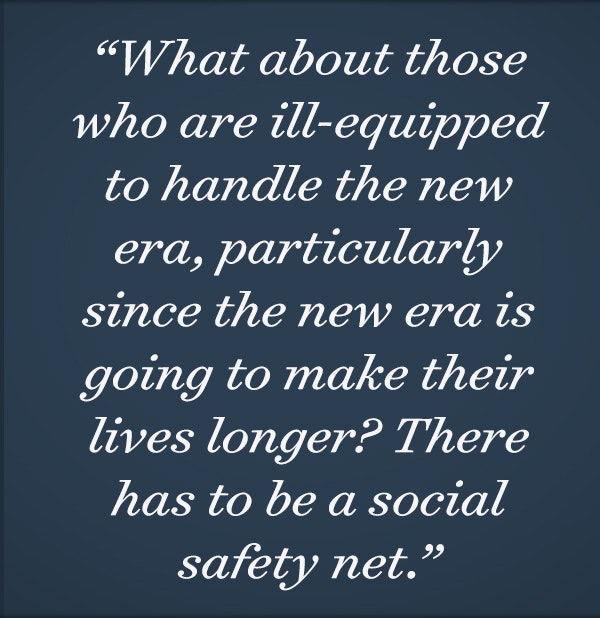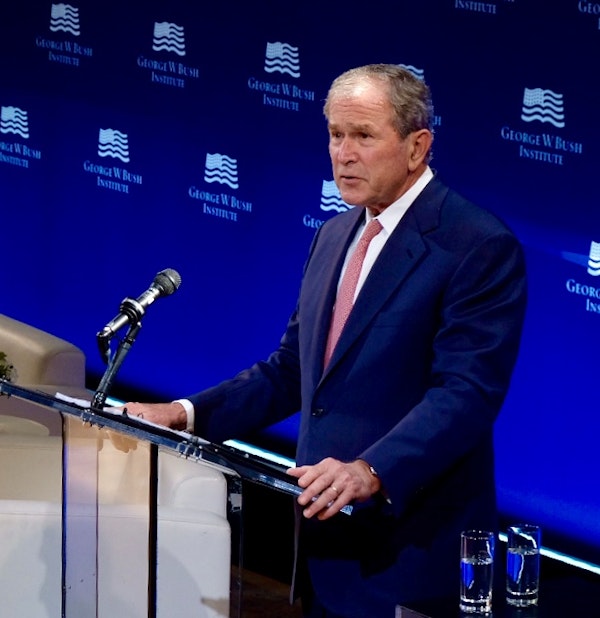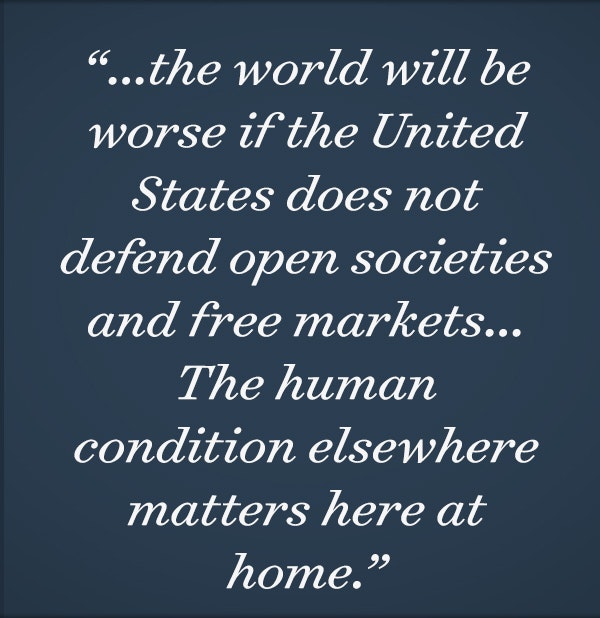President George W. Bush on Compassionate Conservatism
Compassionate conservatism remains as relevant today as when President George W. Bush campaigned for president on its principles in 2000. In this conversation, President Bush takes a deep dive into the philosophy. From helping displaced workers at home through economic policy, to defending the oppressed overseas, to ensuring a quality education for all, the core responsibility of government is to care for its people.
 George W. Bush visits the Chikumbuso Women and Orphans Project in Lusaka, Zambia, as part of a trip supporting Pink Ribbon Red Ribbon, December 3, 2011. Pink Ribbon Red Ribbon built on the work of the President's Emergency Plan for AIDS Relief. (Paul Morse / George W. Bush Presidential Center)
George W. Bush visits the Chikumbuso Women and Orphans Project in Lusaka, Zambia, as part of a trip supporting Pink Ribbon Red Ribbon, December 3, 2011. Pink Ribbon Red Ribbon built on the work of the President's Emergency Plan for AIDS Relief. (Paul Morse / George W. Bush Presidential Center)
Texas Governor George W. Bush ran for president in 2000 on the theme of compassionate conservatism. As part of The Catalyst’s focus on what that term means now, President Bush spoke before the elections with Catalyst Editor William McKenzie about the origins of the phrase, the philosophy that guides it, and compassionate conservatism’s meaning for today.
Looking back, how did the term “compassionate conservatism” come about?
The philosophy took hold in my first race for governor. I remember my announcement tour and subsequent speeches saying, “It is conservative to insist that we measure students in public schools; it is compassionate to teach every child to read.” In other words, it’s conservative to cut taxes; it’s compassionate to let families have more money to spend or give families more of their own money to spend.
I felt compelled to phrase it this way because people hear “conservative” and they think heartless. And my belief then and now is that the right conservative philosophies are compassionate and help people. Compassionate means you care about people and the policies you enunciate help people.
I felt compelled to phrase it this way because people hear “conservative” and they think heartless. And my belief then and now is that the right conservative philosophies are compassionate and help people.
The term was effective politically, although some Republicans viewed it as not harsh enough on the budget. If the critics would compare my budget record to predecessors and successor, they would see that you can be fiscally responsible and compassionate at the same time.
Bill Clinton once later told me, “When you said that compassionate conservative thing, I called Al [Gore} and said, ‘You’ve got a problem. You know that George Bush is smart. He’s going to be compassionate and it doesn’t cost a dime.’”
If you were framing compassionate conservatism today, how would you describe it?
I would frame it the same way. I don’t know if different words are necessary, but I know that it’s necessary to explain to people policies like the recent tax cut. You often would read that the rich would get richer. But a tax cut like that needs to be explained in a way that tells why it affects the average person’s life positively. It’s a simple political principle that good policy makes good politics, but good politics comes out of policies that affect people in a positive way.
You often hear that we need respect and civility…
I’m not sure that respect and civility are a political philosophy so much as they are an understanding of the importance of decency in society, whether in the political arena or how you treat your neighbor. There’s no question we need respect and civility. But is it possible given an environment where news is distributed in such a dispersed way that people tend to channel in on the news that reinforces their current belief?
I’m not sure that respect and civility are a political philosophy so much as they are an understanding of the importance of decency in society, whether in the political arena or how you treat your neighbor.
What do you think?
I do think respect and civility are possible. Ultimately, wise leaders are going to sense this feeling of frustration among voters and rise above all of this.
For example, when Bill Clinton, Barack Obama, and I went to a golf tournament, a picture was taken of us and the public reaction was, Wow, isn’t this wonderful that people can get along. I think there’s a craving for it apart from those who benefit from division.
 Former Presidents Bill Clinton, George W. Bush, and Barack Obama attend the Presidents Cup at Liberty National Golf Club on September 28, 2017, in Jersey City, New Jersey. (Chris Condon / PGA TOUR)
Former Presidents Bill Clinton, George W. Bush, and Barack Obama attend the Presidents Cup at Liberty National Golf Club on September 28, 2017, in Jersey City, New Jersey. (Chris Condon / PGA TOUR)
But the system is structured so that division wins. Primaries are the main determinant of the general election in most districts. A small group of insurgents can upset the status quo pretty quickly.
If you were out on the stump today, how would you speak to people who feel like they’ve been left behind by automation and artificial intelligence?
You would have to explain to people in places like North Carolina why free trade makes sense. I did go to North Carolina to defend a free trade agreement. But I explained that the government has to provide transition money to displaced workers who need to continue to work. And the best way to do that is through community colleges developing a curriculum that meets the needs of new employers.
 President George W. Bush greets the audience after his remarks on job training and the economy at Central Piedmont Community College in Charlotte, N.C., Monday, April 5, 2004. (Eric Draper / White House)
President George W. Bush greets the audience after his remarks on job training and the economy at Central Piedmont Community College in Charlotte, N.C., Monday, April 5, 2004. (Eric Draper / White House)
The challenge in the next wave of productivity and innovation is whether people will be educated to the level that they can transfer skills. A key component of compassionate conservatism is to make sure that education systems are such that we can fix them where there’s failure.
A key component of compassionate conservatism is to make sure that education systems are such that we can fix them where there’s failure.
How should leaders talk about expanding the middle class, the median of which is $61,000 in annual income?
The best way to accumulate wealth over time is through growth in assets, so home ownership and small business ownership are important places to focus. So are tax policy and economic growth, which really affect the middle class.
There’s a theory that all you have to do is run up the minimum wage and wages will go up. That has the opposite effect ironically because it increases the urgency for robots.
The robot issue does present an interesting challenge. My first reaction is to think of the Luddites and how discredited they became over time. I still have the instinct that this kind of innovation will spawn new work and new opportunities. I doubt a 60-year old person is prepared for the change, but somebody who is a teenager now has a much better chance to adapt as robotics spreads.
 Students from Casa View Elementary in Dallas take home the CREATE award at the 2018 VEX Robotics World Championship. (via Twitter @CaseViewES)
Students from Casa View Elementary in Dallas take home the CREATE award at the 2018 VEX Robotics World Championship. (via Twitter @CaseViewES)
An elementary school in an economically-challenged Dallas neighborhood won an international robotics prize. I bring that up because the goal there is for the students to grow up and manage the robot, not work for the robot.
Yes, so you have to be optimistic about what’s coming. But the question always is: What about those who are ill-equipped to handle the new era, particularly since the new era is going to make their lives longer? There has to be a social safety net. Medicare has to be effective. Social Security has to be effective. Of course, the danger for Social Security is not that it’s going to be ineffective for old people, but it’s going to be ineffective for young people.

What about reforming entitlements? We’ve been down that road. What changes that?
I have come to the conclusion that disaster changes it. The political class is delay, delay, delay until a disaster is about to happen. That’s sad, but that’s reality. I campaigned on Social Security reform but couldn’t get my own party to go with it. They worried about losing seats. That’s the kind of system we live in. Maybe reform needs to come incrementally.
And what does compassionate conservatism mean when it comes to global environmental debates?
My answer is one, we should take the issue very seriously; two, we ought to propose plans that work, not plans that satiate the appetite for action but are ineffective; three, we’ve got to have faith in technologies to solve the problem over time; and four, you cannot develop the technologies necessary to deal with carbon without wealth and you can’t generate wealth without hydrocarbons.
We’re in a transition period. Natural gas and nuclear power are necessities until we develop whatever is going to be developed. When I was president, we started looking at hydropower. My attitude was, let’s drop some research money out there and see what evolves. And something will evolve. I’m optimistic we’ll be able to solve the problems.
I’m a little disappointed in the tone of the debate, like if you don’t agree with 100 percent of what I say you’re a denier or a heretic. And I think there’s a certain naiveté to think we can generate enough muscle to develop new technologies without hydrocarbons.
 President Bush delivers the 2006 State of the Union (Eric Draper / White House)
President Bush delivers the 2006 State of the Union (Eric Draper / White House)
But I did say in a State of the Union that we were hooked on foreign oil. And I was willing to try anything. Ethanol is convenient in Iowa, of course. But, on the other hand, wouldn’t it be neat to develop technology so that we grow our way out of dependence?
Technology did lead to a change in energy: fracking. It has created jobs and wealth. More importantly, it has had geo-political and economic benefits.
You have talked about developing consensus around markets and democracy. But how do you do that globally?
I gave a speech on that theme in New York [last year] partly because millennials are beginning to question whether or not capitalism and democracy make sense. Hopefully, the examples of people who’ve tried that model but didn’t make it work, like Venezuela and Zimbabwe, is a compelling enough reason to make people understand that we should make ours work.
This notion of isolationism — let others deal with it; we’re exhausted — is going to create a crisis. Once the crisis is resolved, there will be an assessment of why it occurred. We’ll find out how acute this isolationism is. In other words, it’s not a done deal that the country is stuck in this isolationist rut. The events of this world are going to call upon us to respond.
 President Bush at the Spirit of Liberty event in New York, October 19, 2017. <a href="https://www.bushcenter.org/about-the-center/newsroom/press-releases/2017/10/gwb-lwb-spirit-of-liberty-remarks.html">Watch video of his remarks</a> (Grant Miller / George W. Bush Presidential Center)
President Bush at the Spirit of Liberty event in New York, October 19, 2017. <a href="https://www.bushcenter.org/about-the-center/newsroom/press-releases/2017/10/gwb-lwb-spirit-of-liberty-remarks.html">Watch video of his remarks</a> (Grant Miller / George W. Bush Presidential Center)
The same is true with protectionism. The bad economy caused people to buy into it. But once there is a reason to assess that path, will there be a consensus about missed opportunities because of protectionism? The EU (European Union) and Japan signed a trade agreement last year, and China is kind of filling the void.
This is a hard debate to win. I understand the politics of it. But somebody at some point is going to have to make the case about missed opportunities. Manufacturing jobs that made the washer and dryer may end being made in Japan as opposed to Ohio.
We’re talking about this here at home, but how do you make the case for open societies and democratic institutions around the world?
First, you need credibility. You have to work at it and be willing to defend people who are willing to take the risk to demand open societies. A retreating nation is one that sends chilling signals to reformers, political prisoners, and dissidents. It’s hard to lead while retreating.
A retreating nation is one that sends chilling signals to reformers, political prisoners, and dissidents. It’s hard to lead while retreating.
 Rohingya Muslims fleeing oppression in Burma get off a boat after crossing the border by sea on September 29, 2017. (Ozge Elif Kizil/Anadolu Agency/Getty Images)
Rohingya Muslims fleeing oppression in Burma get off a boat after crossing the border by sea on September 29, 2017. (Ozge Elif Kizil/Anadolu Agency/Getty Images)
At this stage in world history, people feed off the United States. If the U.S. is unwilling to defend the Rohingya, or unwilling to hear the cries of people in Venezuela, the rest of the world will fall deaf.
Who are likely partners around the world?
Our European allies have a bigger problem than we do with this kind of reaction to immigrants and anger in their societies. But, look, there’s nobody who can lead except for us.
Other leaders, like [Vladimir] Putin, probably don’t care that much about development of civil societies. He’s for it so long as it benefits his rule. And Xi Jinping obviously is increasing his power.
It’s just a difficult stage, but the world will be worse if the United States does not defend open societies and free markets. In order to make the case why we should, we’ve got to remind people about 9/11. The human condition elsewhere matters here at home.

You mentioned Russia and China. How do we promote open societies in places like that?
You obviously run into a lot of headwinds in Russia and China. And the interesting question is whether open markets will push for open societies. That will be the challenge for China.
There’s a lot of focus on China’s potential, and China is muscling up. I understand that, but it’s also important to remember that half of China’s gigantic population is broke. And the more open society becomes, the more likely those who are feeling left out can express themselves, like on the internet.
Promoting open societies is not in the interest of humanity; it’s really in our interest. Now some will say, let us not impose our values. But that is an excuse.
Promoting open societies is not in the interest of humanity; it’s really in our interest. Now some will say, let us not impose our values. But that is an excuse.
We have to talk to President Putin about allowing U.S. NGOs [non-governmental organizations] and international NGOs into Russia to help build a civil society. And we need to talk to the Chinese about religious freedom. People knew that I cared about open societies and freedom of religion, so they would ask me to deliver messages on behalf of others and I did. The absence of that encourages those who get fearful of open societies to feel free to close them.
The Catalyst believes that ideas matter. We aim to stimulate debate on the most important issues of the day, featuring a range of arguments that are constructive, high-minded, and share our core values of freedom, opportunity, accountability, and compassion. To that end, we seek out ideas that may challenge us, and the authors’ views presented here are their own; The Catalyst does not endorse any particular policy, politician, or party.

